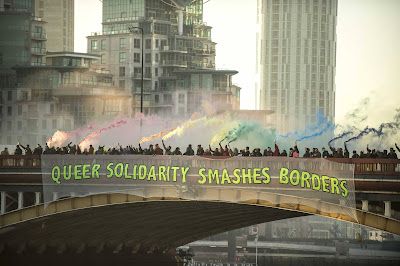Queer politics need to embrace antiracism and refuse complicity with nationalist and militarist projects
"While the gay and lesbian liberation movements of the
1970s still aimed for radical
social and cultural change, the 1980s saw a modelling of queer diversity
along the lines of an ethnicized, multicultural politics of recognition (Taylor
1992). [...] It has been argued that neoliberal politics have taken central
concerns of sexual politics inspired by the civil rights era such as freedom
and liberation and remapped them in terms of privacy, consumption and
domestic bliss (Gluckman and Reed 21997; Duggan 2003; Richardson 2004,
2005; Katz 2005; Weiss 2008; Engel 2009). The fight for equality has by now
taken centre stage for mainstream LGBT organizations in North America and
Western Europe, the argument being that gays and lesbians are, and need to be
recognized as, responsible citizens like any (heterosexual) other. [...]
When in 1997, organizers of the main gay pride parade [...] [in Berlin] started to demand fees for participating floats, rebel protesters were relegated to the end of the march. They and other, including migrant, queer groups in turn decided to start an alternative gay pride parade called the Transgenial Christopher Street Day (CSD) and more recently simply Kreuzberg CSD, to protest against the growing commercialization and white homonormativity of the mainstream pride event, [...]. The Kreuzberg CSD, which has been drawing crowds of 2,000–5,000 people, has been marked by the absence of corporate sponsoring and political parties, and by the conjunction of political issues beyond the fight against homophobia: racism, gentrification and poverty are concerns that each year figure prominently in speeches and on banners. [...]
In 2010 philosopher and gender theorist Judith Butler was invited by the organizers of the main pride
parade to be honoured with the ‘civil courage award’ that is presented each
year at the march to individuals or institutions that have made special
contributions to gay and lesbian causes. Up on stage near the Brandenburg Gate,
in front of several hundred thousand participants, Butler refused the award,
stating that she had only now been made aware of the overly commercialized
character of the main pride parade and the racist as well as imperialist
positions that many of the participating organizations embraced by refusing to
see antiracism as a central part of their work. Queer politics need to embrace antiracism and refuse complicity with
nationalist and militarist projects, she argued, [...]".
Kira Kosnick (2015), "A Clash of Subcultures? Questioning Queer Muslim Antagonisms in the Neoliberal City", in International Journal of Urban and Regional Research, 39(4): 692, 693 and 696.
Image: A banner drop and rainbow at Vauxhall Bridge in London
on 20 January 2016, to show solidarity with all the people affected by the rise
of the far right, courtesy of Lesbians
and Gays Support the Migrants

Comments